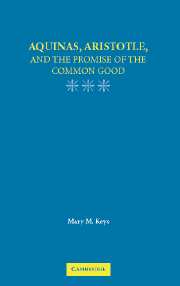Book contents
- Frontmatter
- Contents
- Acknowledgments
- PART I VIRTUE, LAW, AND THE PROBLEM OF THE COMMON GOOD
- PART II AQUINAS'S SOCIAL AND CIVIC FOUNDATIONS
- PART III MORAL VIRTUES AT THE NEXUS OF PERSONAL AND COMMON GOODS
- 6 Remodeling the Moral Edifice (I): Aquinas and Aristotelian Magnanimity
- 7 Remodeling the Moral Edifice (II): Aquinas and Aristotelian Legal Justice
- PART IV POLITICS, HUMAN LAW, AND TRANSPOLITICAL VIRTUE
- Works Cited
- Index
6 - Remodeling the Moral Edifice (I): Aquinas and Aristotelian Magnanimity
Published online by Cambridge University Press: 25 July 2009
- Frontmatter
- Contents
- Acknowledgments
- PART I VIRTUE, LAW, AND THE PROBLEM OF THE COMMON GOOD
- PART II AQUINAS'S SOCIAL AND CIVIC FOUNDATIONS
- PART III MORAL VIRTUES AT THE NEXUS OF PERSONAL AND COMMON GOODS
- 6 Remodeling the Moral Edifice (I): Aquinas and Aristotelian Magnanimity
- 7 Remodeling the Moral Edifice (II): Aquinas and Aristotelian Legal Justice
- PART IV POLITICS, HUMAN LAW, AND TRANSPOLITICAL VIRTUE
- Works Cited
- Index
Summary
In his preface to Dependent Rational Animals, Alasdair MacIntyre quotes a prayer composed by Thomas Aquinas “in which he asks God to grant that he may happily share with those in need what he has, while humbly asking for what he needs from those who have.” It is a prayer of a magnanimous person in humility, highlighting the two qualities that when fused together seem to distinguish, morally and politically, the Christian world from the classical world. Yet, as Aquinas himself notes elsewhere, it is far from clear how humility can be compatible with magnanimity, a virtue conducing to outstanding statesmanship: “humility is apparently opposed to the virtue of magnanimity, which aims at great things, whereas humility shuns them” (ST II–II 161, 1, obj. 3). Even if humility is vindicated as an ethical excellence, can it be politically salutary? Should politics, understood as humans' own government, be suffused with pride in human virtue, or should it be humbled by the realization of human dependence on God and interdependence with others?
In this chapter I revisit the theories of magnanimity advanced by Aristotle and Thomas Aquinas, endeavoring especially to develop a more detailed analysis and comparison of Aquinas's Commentary on the “NE” and the relevant texts of the ST than those offered by other recent commentators. In particular, I consider Aquinas's discussions in the ST of two of what MacIntyre (1999) terms “virtues of acknowledged dependence”: gratitude and humility.
- Type
- Chapter
- Information
- Aquinas, Aristotle, and the Promise of the Common Good , pp. 143 - 172Publisher: Cambridge University PressPrint publication year: 2006
- 1
- Cited by



